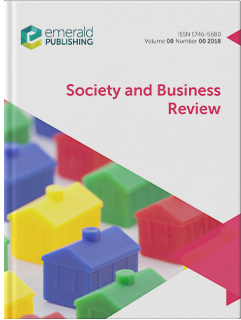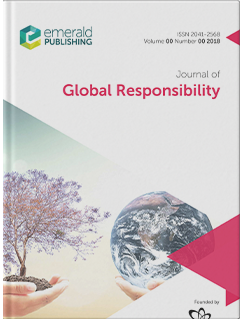
Journal of Global Responsibility
Before you start
Author responsibilities
Our goal is to provide you with a professional and courteous experience at each stage of the review and publication process. There are also some responsibilities that sit with you as the author. Our expectation is that you will:
- Respond swiftly to any queries during the publication process.
- Be accountable for all aspects of your work. This includes investigating and resolving any questions about accuracy or research integrity
- Treat communications between you and the journal editor as confidential until an editorial decision has been made.
- Read about our research ethics for authorship. These state that you must:
- Include anyone who has made a substantial and meaningful contribution to the submission (anyone else involved in the paper should be listed in the acknowledgements).
- Exclude anyone who hasn’t contributed to the paper, or who has chosen not to be associated with the research.
- In accordance with COPE’s position statement on AI tools, Large Language Models cannot be credited with authorship as they are incapable of conceptualising a research design without human direction and cannot be accountable for the integrity, originality, and validity of the published work.
- If your article involves human participants, you must ensure you have considered whether or not you require ethical approval for your research, and include this information as part of your submission. Find out more about informed consent.
Research and publishing ethics
Our editors and employees work hard to ensure the content we publish is ethically sound. To help us achieve that goal, we closely follow the advice laid out in the guidelines and flowcharts on the COPE (Committee on Publication Ethics) website.
We have also developed our research and publishing ethics guidelines. If you haven’t already read these, we urge you to do so – they will help you avoid the most common publishing ethics issues.
A few key points:
- Any manuscript you submit to this journal should be original. That means it should not have been published before in its current, or similar, form. Exceptions to this rule are outlined in our pre-print and conference paper policies. If any substantial element of your paper has been previously published, you need to declare this to the journal editor upon submission. Please note, the journal editor may use Crossref Similarity Check to check on the originality of submissions received. This service compares submissions against a database of 49 million works from 800 scholarly publishers.
- Any manuscript you submit to this journal should be original. That means it should not have been published before in its current, or similar, form except for a firm’s internal publications. Other exceptions to this rule are outlined in our pre-print and conference paper policies. It is recognized that an article for the journal may be an adaptation and update of an earlier paper that has been published only internally, such as a law firm client memorandum that is copyrighted by the firm in its original form. If any substantial element of your paper has been previously published, you need to declare this to the journal editor upon submission. Please note, the journal editor may use Crossref Similarity Check to check on the originality of submissions received.
- Your work should not have been submitted elsewhere and should not be under consideration by any other publication.
- If you have a conflict of interest, you must declare it upon submission; this allows the editor to decide how they would like to proceed. Read about conflict of interest in our research and publishing ethics guidelines.
- By submitting your work to Emerald, you are guaranteeing that the work is not in infringement of any existing copyright.
Third party copyright permissions
Prior to article submission, you need to ensure you’ve applied for, and received, written permission to use any material in your manuscript that has been created by a third party. Please note, we are unable to publish any article that still has permissions pending. The rights we require are:
- Non-exclusive rights to reproduce the material in the article or book chapter.
- Print and electronic rights.
- Worldwide English-language rights.
- To use the material for the life of the work. That means there should be no time restrictions on its re-use e.g. a one-year licence.
We are a member of the International Association of Scientific, Technical, and Medical Publishers (STM) and participate in the STM permissions guidelines, a reciprocal free exchange of material with other STM publishers. In some cases, this may mean that you don’t need permission to re-use content. If so, please highlight this at the submission stage.
Please take a few moments to read our guide to publishing permissions to ensure you have met all the requirements, so that we can process your submission without delay.
Open access submissions and information
All our journals currently offer two open access (OA) publishing paths; gold open access and green open access.
If you would like to, or are required to, make the branded publisher PDF (also known as the version of record) freely available immediately upon publication, you can select the gold open access route once your paper is accepted.
If you’ve chosen to publish gold open access, this is the point you will be asked to pay the APC (article processing charge). This varies per journal and can be found on our APC price list or on the editorial system at the point of submission. Your article will be published with a Creative Commons CC BY 4.0 user licence, which outlines how readers can reuse your work.
Alternatively, if you would like to, or are required to, publish open access but your funding doesn’t cover the cost of the APC, you can choose the green open access, or self-archiving, route. As soon as your article is published, you can make the author accepted manuscript (the version accepted for publication) openly available, free from payment and embargo periods.
You can find out more about our open access routes, our APCs and waivers and read our FAQs on our open research page.
Transparency and Openness Promotion (TOP) guidelines
We are a signatory of the Transparency and Openness Promotion (TOP) Guidelines, a framework that supports the reproducibility of research through the adoption of transparent research practices. That means we encourage you to:
- Cite and fully reference all data, program code, and other methods in your article.
- Include persistent identifiers, such as a Digital Object Identifier (DOI), in references for datasets and program codes. Persistent identifiers ensure future access to unique published digital objects, such as a piece of text or datasets. Persistent identifiers are assigned to datasets by digital archives, such as institutional repositories and partners in the Data Preservation Alliance for the Social Sciences (Data-PASS).
- Follow appropriate international and national procedures with respect to data protection, rights to privacy and other ethical considerations, whenever you cite data. For further guidance please refer to our research and publishing ethics guidelines. For an example on how to cite datasets, please refer to the references section below.
Prepare your submission
Manuscript support services
We are pleased to partner with Editage, a platform that connects you with relevant experts in language support, translation, editing, visuals, consulting, and more. After you’ve agreed a fee, they will work with you to enhance your manuscript and get it submission-ready.
This is an optional service for authors who feel they need a little extra support. It does not guarantee your work will be accepted for review or publication.
Manuscript requirements
Before you submit your manuscript, it’s important you read and follow the guidelines below. You will also find some useful tips in our structure your journal submission how-to guide.
|
Format |
Article files should be provided in Microsoft Word format While you are welcome to submit a PDF of the document alongside the Word file, PDFs alone are not acceptable. LaTeX files can also be used but only if an accompanying PDF document is provided. Acceptable figure file types are listed further below. |
|
Article length / wordcount |
Articles should be between 6,000 and 7,000 words in length. This includes all text, for example, the structured abstract, references, all text in tables, and figures and appendices. Please allow 280 words for each figure or table. |
|
Article title |
A concisely worded title should be provided. |
|
Author details |
The names of all contributing authors should be added to the ScholarOne submission; please list them in the order in which you’d like them to be published. Each contributing author will need their own ScholarOne author account, from which we will extract the following details:
In multi-authored papers, it’s important that ALL authors that have made a significant contribution to the paper are listed. Those who have provided support but have not contributed to the research should be featured in an acknowledgements section. You should never include people who have not contributed to the paper or who don’t want to be associated with the research. Read about our research ethics for authorship. |
|
Biographies and acknowledgements |
If you want to include these items, save them in a separate Microsoft Word document and upload the file with your submission. Where they are included, a brief professional biography of not more than 100 words should be supplied for each named author.
|
|
Research funding |
Your article must reference all sources of external research funding in the acknowledgements section. You should describe the role of the funder or financial sponsor in the entire research process, from study design to submission. |
|
Structured abstract |
All submissions must include a structured abstract, following the format outlined below. These four sub-headings and their accompanying explanations must always be included:
The following three sub-headings are optional and can be included, if applicable:
The maximum length of your abstract should be 250 words in total, including keywords and article classification (see the sections below). |
|
Keywords |
Your submission should include up to 12 appropriate and short keywords that capture the principal topics of the paper. Our Creating an SEO-friendly manuscript how to guide contains some practical guidance on choosing search-engine friendly keywords. Please note, while we will always try to use the keywords you’ve suggested, the in-house editorial team may replace some of them with matching terms to ensure consistency across publications and improve your article’s visibility. |
|
Article classification |
During the submission process, you will be asked to select a type for your paper; the options are listed below. For detailed descriptions on those types of papers/articles, please see JGR’s Aims and Scope. If you do not see an exact match, please choose the best fit: Type of Paper:
You will also be asked to select a category for your paper. The options for this are listed below. If you don’t see an exact match, please choose the best fit. Category of Research Paper:
|
|
Headings |
Headings must be concise, with a clear indication of the required hierarchy. |
|
Notes/endnotes |
Notes or endnotes should only be used if absolutely necessary. They should be identified in the text by consecutive numbers enclosed in square brackets. These numbers should then be listed, and explained, at the end of the article. |
|
Figures |
All figures (charts, diagrams, line drawings, webpages/screenshots, and photographic images) should be submitted electronically. Both colour and black and white files are accepted.
|
|
Tables |
Tables should be typed and submitted in a separate file to the main body of the article. The position of each table should be clearly labelled in the main body of the article with corresponding labels clearly shown in the table file. Tables should be numbered consecutively in Roman numerals (e.g. I, II, etc.). |
|
Supplementary files |
Where tables, figures, appendices, and other additional content are supplementary to the article but not critical to the reader’s understanding of it, you can choose to host these supplementary files alongside your article on Insight, Emerald’s content hosting platform, or on an institutional or personal repository. All supplementary material must be submitted prior to acceptance. If you choose to host your supplementary files on Insight, you must submit these as separate files alongside your article. Files should be clearly labelled in such a way that makes it clear they are supplementary; Emerald recommends that the file name is descriptive and that it follows the format ‘Supplementary_material_appendix_1’ or ‘Supplementary tables’. All supplementary material must be mentioned at the appropriate moment in the main text of the article, there is no need to include the content of the file but only the file name. A link to the supplementary material will be added to the article during production, and the material will be made available alongside the main text of the article at the point of EarlyCite publication. Please note that Emerald will not make any changes to the material; it will not be copyedited, typeset, and authors will not receive proofs. Emerald therefore strongly recommends that you style all supplementary material ahead of acceptance of the article. Emerald Insight can host the following file types and extensions:
If you choose to use an institutional or personal repository, you should ensure that the supplementary material is hosted on the repository ahead of submission, and then include a link only to the repository within the article. It is the responsibility of the submitting author to ensure that the material is free to access and that it remains permanently available. Please note that extensive supplementary material may be subject to peer review; this is at the discretion of the journal Editor and dependent on the content of the material (for example, whether including it would support the reviewer making a decision on the article during the peer review process). |
|
References
|
All references in your manuscript must be formatted using one of the recognised Harvard styles. You are welcome to use the Harvard style Emerald has adopted – we’ve provided a detailed guide below. Want to use a different Harvard style? That’s fine, our typesetters will make any necessary changes to your manuscript if it is accepted. Please ensure you check all your citations for completeness, accuracy and consistency; this enables your readers to exploit the reference linking facility on the database and link back to the works you have cited through CrossRef. Emerald’s Harvard referencing style References to other publications in your text should be written as follows:
A few other style points. These apply to both the main body of text and your final list of references.
At the end of your paper, please supply a reference list in alphabetical order using the style guidelines below. Where a DOI is available, this should be included at the end of the reference. |
|
For books |
Surname, initials (year), title of book, publisher, place of publication. e.g. Harrow, R. (2005), No Place to Hide, Simon & Schuster, New York, NY. |
|
For book chapters |
Surname, initials (year), "chapter title", editor's surname, initials (Ed.), title of book, publisher, place of publication, page numbers. e.g. Calabrese, F.A. (2005), "The early pathways: theory to practice – a continuum", Stankosky, M. (Ed.), Creating the Discipline of Knowledge Management, Elsevier, New York, NY, pp.15-20. |
|
For journals |
Surname, initials (year), "title of article", journal name, volume issue, page numbers. e.g. Capizzi, M.T. and Ferguson, R. (2005), "Loyalty trends for the twenty-first century", Journal of Consumer Marketing, Vol. 22 No. 2, pp.72-80. |
|
For published |
Surname, initials (year of publication), "title of paper", in editor’s surname, initials (Ed.), title of published proceeding which may include place and date(s) held, publisher, place of publication, page numbers. e.g. Wilde, S. and Cox, C. (2008), “Principal factors contributing to the competitiveness of tourism destinations at varying stages of development”, in Richardson, S., Fredline, L., Patiar A., & Ternel, M. (Ed.s), CAUTHE 2008: Where the 'bloody hell' are we?, Griffith University, Gold Coast, Qld, pp.115-118. |
|
For unpublished |
Surname, initials (year), "title of paper", paper presented at [name of conference], [date of conference], [place of conference], available at: URL if freely available on the internet (accessed date). e.g. Aumueller, D. (2005), "Semantic authoring and retrieval within a wiki", paper presented at the European Semantic Web Conference (ESWC), 29 May-1 June, Heraklion, Crete, available at: http://dbs.uni-leipzig.de/file/aumueller05wiksar.pdf (accessed 20 February 2007). |
|
For working papers |
Surname, initials (year), "title of article", working paper [number if available], institution or organization, place of organization, date. e.g. Moizer, P. (2003), "How published academic research can inform policy decisions: the case of mandatory rotation of audit appointments", working paper, Leeds University Business School, University of Leeds, Leeds, 28 March. |
|
For encyclopaedia entries |
Title of encyclopaedia (year), "title of entry", volume, edition, title of encyclopaedia, publisher, place of publication, page numbers. e.g. Encyclopaedia Britannica (1926), "Psychology of culture contact", Vol. 1, 13th ed., Encyclopaedia Britannica, London and New York, NY, pp.765-771. (for authored entries, please refer to book chapter guidelines above) |
|
For newspaper |
Surname, initials (year), "article title", newspaper, date, page numbers. e.g. Smith, A. (2008), "Money for old rope", Daily News, 21 January, pp.1, 3-4. |
|
For newspaper |
Newspaper (year), "article title", date, page numbers. e.g. Daily News (2008), "Small change", 2 February, p.7. |
|
For archival or other unpublished sources |
Surname, initials (year), "title of document", unpublished manuscript, collection name, inventory record, name of archive, location of archive. e.g. Litman, S. (1902), "Mechanism & Technique of Commerce", unpublished manuscript, Simon Litman Papers, Record series 9/5/29 Box 3, University of Illinois Archives, Urbana-Champaign, IL. |
|
For electronic sources |
If available online, the full URL should be supplied at the end of the reference, as well as the date that the resource was accessed. Surname, initials (year), “title of electronic source”, available at: persistent URL (accessed date month year). e.g. Weida, S. and Stolley, K. (2013), “Developing strong thesis statements”, available at: https://owl.english.purdue.edu/owl/resource/588/1/ (accessed 20 June 2018) Standalone URLs, i.e. those without an author or date, should be included either inside parentheses within the main text, or preferably set as a note (roman numeral within square brackets within text followed by the full URL address at the end of the paper). |
|
For data |
Surname, initials (year), title of dataset, name of data repository, available at: persistent URL, (accessed date month year). e.g. Campbell, A. and Kahn, R.L. (2015), American National Election Study, 1948, ICPSR07218-v4, Inter-university Consortium for Political and Social Research (distributor), Ann Arbor, MI, available at: https://doi.org/10.3886/ICPSR07218.v4 (accessed 20 June 2018) |
Submit your manuscript
There are a number of key steps you should follow to ensure a smooth and trouble-free submission.
Double check your manuscript
Before submitting your work, it is your responsibility to check that the manuscript is complete, grammatically correct, and without spelling or typographical errors. A few other important points:
- Give the journal aims and scope a final read. Is your manuscript definitely a good fit? If it isn’t, the editor may decline it without peer review.
- Does your manuscript comply with our research and publishing ethics guidelines?
- Have you cleared any necessary publishing permissions?
- Have you followed all the formatting requirements laid out in these author guidelines?
- Does the manuscript contain any information that might help the reviewer identify you? This could compromise the blind peer review process. A few tips:
- If you need to refer to your own work, use wording such as ‘previous research has demonstrated’ not ‘our previous research has demonstrated’.
- If you need to refer to your own, currently unpublished work, don’t include this work in the reference list.
- Any acknowledgments or author biographies should be uploaded as separate files.
- Carry out a final check to ensure that no author names appear anywhere in the manuscript. This includes in figures or captions.
You will find a helpful submission checklist on the website Think.Check.Submit.
Consider sharing your data
If you would like to offer readers the opportunity to access the analytical code and data underlying your research findings, the first step is to select an appropriate research data repository to upload it to. This might be one run by your own institution, or it could be a third-party platform such as Dryad, Figshare, Open Science Framework, Zenodo, UK Data Service ReShare, OpenICPSR, or Qualitative Data Repository. The repositories will provide you with a citable DOI (Digital Object Identifier) which should be included in your submission. Further repositories can be found on the Registry of Research Data Repositories (Re3Data).
A few important points:
- In the acknowledgments or first footnote of your paper, you must state whether or not your data, analytic methods, and study materials will be shared with other researchers.
- If you have decided to share them, you must specify where the material can be accessed.
- Emerald encourages responsible data sharing; if your dataset contains information that an organisation might consider confidential, or it identifies an individual or company and you don’t have their consent, please liaise with your institution before uploading the data. In addition, if your dataset could be considered the property of someone else, you will need their permission before uploading it to a public repository.
Why share your data?
Sharing of research data brings a number of benefits. It can:
- Reduce duplication of data collection and processing efforts
- Increase the impact (citations) of your research
- Aid new research
- Increase the credibility of the findings
- Enable research to be reproduced
Maximise the impact of your research by following best practices when sharing data, for example, compile a data dictionary listing the variables involved.
The submission process
All submissions to JGR should follow a set template. Please download one of the following:
- LaTeX version plus CLS file
All manuscripts should be submitted through our editorial system by the corresponding author.
The only way to submit to the journal is through the journal’s ScholarOne site as accessed via the Emerald website, and not by email or through any third-party agent/company, journal representative, or website. Submissions should be done directly by the author(s) through the ScholarOne site and not via a third-party proxy on their behalf.
A separate author account is required for each journal you submit to. If this is your first time submitting to this journal, please choose the Create an account or Register now option in the editorial system. If you already have an Emerald login, you are welcome to reuse the existing username and password here.
Please note, the next time you log into the system, you will be asked for your username. This will be the email address you entered when you set up your account.
Don't forget to add your ORCiD ID during the submission process. It will be embedded in your published article, along with a link to the ORCiD registry allowing others to easily match you with your work.
Don’t have one yet? It only takes a few moments to register for a free ORCiD identifier.
Visit the ScholarOne support centre for further help and guidance.
What you can expect next
You will receive an automated email from the journal editor, confirming your successful submission. It will provide you with a manuscript number, which will be used in all future correspondence about your submission. If you have any reason to suspect the confirmation email you receive might be fraudulent, please contact our Rights team.
Manuscript transfer service
Emerald’s manuscript transfer service takes the pain out of the submission process if your manuscript doesn’t fit your initial journal choice. Our team of expert Editors from participating journals work together to identify alternative journals that better align with your research, ensuring your work finds the ideal publication home it deserves. Our dedicated team is committed to supporting authors like you in finding the right home for your research.
If a journal is participating in the manuscript transfer program, the Editor has the option to recommend your paper for transfer. If a transfer decision is made by the Editor, you will receive an email with the details of the recommended journal and the option to accept or reject the transfer. It’s always down to you as the author to decide if you’d like to accept. If you do accept, your paper and any reviewer reports will automatically be transferred to the recommended journals. Authors will then confirm resubmissions in the new journal’s ScholarOne system.
Our Manuscript Transfer Service page has more information on the process.
Post submission
Review and decision process
Each submission is checked by the editor. At this stage, they may choose to decline or unsubmit your manuscript if it doesn’t fit the journal aims and scope, or they feel the language/manuscript quality is too low.
If they think it might be suitable for the publication, they will send it to at least two independent referees for double blind peer review. Once these reviewers have provided their feedback, the editor may decide to accept your manuscript, request minor or major revisions, or decline your work.
While all journals work to different timescales, the goal is that the editor will inform you of their first decision within 60 days.
During this period, we will send you automated updates on the progress of your manuscript via our submission system, or you can log in to check on the current status of your paper. Each time we contact you, we will quote the manuscript number you were given at the point of submission. If you receive an email that does not match these criteria, it could be fraudulent and we recommend you email [email protected].
If your submission is accepted
Open access
Once your paper is accepted, you will have the opportunity to indicate whether you would like to publish your paper via the gold open access route.
If you’ve chosen to publish gold open access, this is the point you will be asked to pay the APC (article processing charge). This varies per journal and can be found on our APC price list or on the editorial system at the point of submission. Your article will be published with a Creative Commons CC BY 4.0 user licence, which outlines how readers can reuse your work.
Copyright
All accepted authors are sent an email with a link to a licence form. This should be checked for accuracy, for example whether contact and affiliation details are up to date and your name is spelled correctly, and then returned to us electronically. If there is a reason why you can’t assign copyright to us, you should discuss this with your journal content editor. You will find their contact details on the editorial team section above.
Proofing and typesetting
Once we have received your completed licence form, the article will pass directly into the production process. We will carry out editorial checks, copyediting, and typesetting and then return proofs to you (if you are the corresponding author) for your review. This is your opportunity to correct any typographical errors, grammatical errors or incorrect author details. We can’t accept requests to rewrite texts at this stage.
When the page proofs are finalised, the fully typeset and proofed version of record is published online. This is referred to as the EarlyCite version. While an EarlyCite article has yet to be assigned to a volume or issue, it does have a digital object identifier (DOI) and is fully citable. It will be compiled into an issue according to the journal’s issue schedule, with papers being added by chronological date of publication.
How to share your paper
Visit our author rights page to find out how you can reuse and share your work.
To find tips on increasing the visibility of your published paper, read about how to promote your work.
Correcting inaccuracies in your published paper
Sometimes errors are made during the research, writing and publishing processes. When these issues arise, we have the option of withdrawing the paper or introducing a correction notice. Find out more about our article withdrawal and correction policies.
Need to make a change to the author list? See our frequently asked questions (FAQs) below.
Frequently asked questions
The only time we will ever ask you for money to publish in an Emerald journal is if you have chosen to publish via the gold open access route. You will be asked to pay an APC (article-processing charge) once your paper has been accepted (unless it is a sponsored open access journal), and never at submission.
At no other time will you be asked to contribute financially towards your article’s publication, processing, or review. If you haven’t chosen gold open access and you receive an email that appears to be from Emerald, the journal, or a third party, asking you for payment to publish, please contact our support team via [email protected].
-
Editor
-
Henri
Kuokkanen
Institut Lyfe - France
[email protected] -
Willy
Legrand
IU International University of Applied Sciences - Germany
[email protected]
-
Henri
Kuokkanen
-
Associate Editor
-
Adalberto
Arrigoni
Leeds Business School - UK
-
Li
Ding
Institut Lyfe - France
-
Ozgur
Isil
University of Scranton - USA
-
Tan
Kim Lim
James Cook University - Singapore
-
Solon
Magrizos
University of Birmingham - UK
-
Farzana
Quoquab
University Teknologi Malaysia - Malaysia
-
Adalberto
Arrigoni
-
Publisher
-
Joseph
Johnson
Emerald Publishing - UK
[email protected]
-
Joseph
Johnson
-
Journal Editorial Office (For queries related to pre-acceptance)
-
Sharon Sebastian
Kanappally
Emerald Publishing
[email protected]
-
Sharon Sebastian
Kanappally
-
Supplier Project Manager (For queries related to post-acceptance)
-
Sagar
Gaikwad
Emerald Publishing
[email protected]
-
Sagar
Gaikwad
-
Former Editor
-
Grant
Johns
Macquarie Graduate School of Management - Australia
-
Simon
Robinson
Leeds Business School - UK
-
William
Sun (2020-2023)
Leeds Beckett University - UK
-
Grant
Johns
-
The Policy Board
-
Thomas
Clarke
University of Technology, Sydney - Australia
-
Mervyn
King
International Integrated Reporting Council - UK
-
Abagail
McWilliams
University of Illinois at Chicago - USA
-
John
North
Globally Responsible Leadership Initiative - Belgium
-
Roland
Pérez
Montpellier University I - France
-
Edward
Weisband
Virginia Tech - USA
-
Thomas
Clarke
-
Editorial Board
-
Professor
Sharam
Alijani
NEOMA Business School - France
-
Professor
Nilesh
Arora
Chandigarh University - India
-
Dr.
Alan
Burton-Jones
Griffith University - Australia
-
Paul
Dowson
Bath Spa University - UK
-
Professor
Simon
Gardiner
Open University - UK
-
Dr
Abderrahman
Hassi
Al Akhawayn University - Morocco
-
Professor
Thomas
Hemphill
University of Michigan-Flint - USA
-
Dr
Richard
Howarth
Nottingham Trent University - UK
-
Dr
Dave
Hufton
Leeds Business School - UK
-
Professor
Obiora
Ike
Global Ethics - Switzerland
-
Professor
Derick de
Jongh
University of Pretoria - South Africa
-
Professor
Birgit
Kleymann
Hamm-Lippstadt University of Applied Sciences - Germany
-
Dr
Anastasia
Konstantopoulou
Edge Hill University - UK
-
Dr.
Ioannis
Kostopoulos
Liverpool John Moores University - UK
-
Dr
Patrick
Kraus
Hochschule Pforzheim - Germany
-
Dr
Amoako
Kwarteng
Ghana Institute of Management and Public Administration, Ghana
-
Professor
George
Lodorfos
Leeds Business School - UK
-
Professor
Paul
Manning
University of Chester - UK
-
Professor
Frans
Melissen
NHTV Breda University of Applied Science - The Netherlands
-
Dr
Jihad
Mohammad
Qatar University, Doha - Qatar
-
Professor
John
Mooney
Pepperdine University - USA
-
Dr
Jose
Pereyra Lopez
Centrum Pontificia, Universidad Catolica dei Peru - Peru
-
Dr
Laura
Quinn
Centre for Creative Leadership - USA
-
Dr
Shafique ur
Rehman
Universiti Utara Malaysia - Malaysia
-
Dr.
Jonathan
Smith
Director, Salmon Personal Development Ltd - UK
-
Professor
Robert
Sroufe
Duquesne Business School - USA
-
Professor
Peter
Stokes
De Montfort University - UK
-
Professor
Patrick
Velte
Leuphana University of Lueneburg - Germany
-
Dr.
Alec
Wersun
Glasgow Caledonian University - UK
-
Professor
Sharam
Alijani
-
Editorial Review Board
-
Vivek
Aggarwal
Swami Vivekananda Subharti University - India
-
Bello Usman
Baba
Bauchi State University - Nigeria
-
Justyna
Berniak-Woźny
Vistula University - Poland
-
Fitra Roman
Cahaya
University of Essex - UK
-
Mats
Carlbäck
Orebro University - Sweden
-
Ananda
Das Gupta
St. Joseph's Institute of Management Bangalore - India
-
Faisal
Faisal
Diponegoro University - Indonesia
-
Zeeshan
Fareed
School of Economics and Management, Huzhou University - Peoples Republic of China
-
Lamprinakos
Grigorios
University of Birmingham - UK
-
Uma
Gupta
Upstate University of South Carolina - USA
-
Abderrahman
Hassi
Al Akhawayn University - Morocco
-
Ivy S.H.
Hii
Curtin University - Malaysia
-
Clare
Hindley
IU International University of Applied Sciences, Department of Management and Business - Germany
-
Richard
Howarth
Nottingham Trent University - UK
-
Muhammad
Ikram
Shenzhen University - People's Republic of China
-
Ozgur
Isil
University of Scranton - USA
-
Talat
Islam
University of the Punjab - Pakistan
-
Zul-Atfi
Ismail
Universiti Malaysia Perlis - Malaysia
-
Siriwan
Kaewchird
Metropolitan Electricity Authority - Thailand
-
Navaneethakrishnan
Kengatharan
University of Jaffna - Sri Lanka
-
Tan
Kim Lim
James Cook University - Singapore
-
Patrick
Kraus
Hochschule Pforzheim - Germany
-
Amoako
Kwarteng
Ghana Institute of Management and Public Administration, Ghana
-
Gabriel
Laeis
IU International University of Applied Sciences, Department of Hospitality, Tourism and Event Management - Germany
-
Xin-Jean
Lim
Universiti Kebangsaan - Malaysia
-
I-Hsuan
Lin
College of Saint Rose - USA
-
Henry Kofi
Mensah
Kwame Nkrumah University - Ghana
-
Marwa
Moalla
University of Sfax - Tunisia
-
Jihad
Mohammad
Qatar University, Doha - Qatar
-
Mike
Nerantzidis
University of Thessaly - Greece
-
Haitham
Nobane
Abu Dhabi University - U.A.E
-
Joseph
Nyeadi
University of Mines and Technology - Ghana
-
Ammani
Pagadala
National Institute of Construction Management and Research - India
-
Simone
Pizzi
Univeristà del Salento - Italy
-
Shafique ur
Rehman
Universiti Utara Malaysia - Malaysia
-
Zahid
Riaz
Lahore School of Economics - Pakistan
-
Cameron
Richards
Southern Cross University - Australia
-
Aymend
Sajjad
Massey Business School - New Zealand
-
Bhavin
Shah
Indian Institute of Management Sirmaur - India
-
Moade
Shubita
Leeds Business School - UK
-
Reeta
Singh
Malaviya National Institute of Technology - India
-
Meredith
Storey
UN Sustainable Development Solutions Network - USA
-
Martina
Topic
College of Communication and Information Sciences, University of Alabama - USA
-
Jeffrey
Yee
Quest International University - Malaysia
-
Mohammad
Zaid
Dongbei University of Finance & Economics - China
-
Vivek
Aggarwal
Citation metrics
5.4
CiteScore 2023
5.4
CiteScore 2023
Further information
CiteScore is a simple way of measuring the citation impact of sources, such as journals.
Calculating the CiteScore is based on the number of citations to documents (articles, reviews, conference papers, book chapters, and data papers) by a journal over four years, divided by the number of the same document types indexed in Scopus and published in those same four years.
For more information and methodology visit the Scopus definition
5.2
CiteScore Tracker 2024
(updated monthly)
5.2
CiteScore Tracker 2024
(updated monthly)
Further information
CiteScore is a simple way of measuring the citation impact of sources, such as journals.
CiteScore Tracker is calculated in the same way as CiteScore, but for the current year rather than previous, complete years.
The CiteScore Tracker calculation is updated every month, as a current indication of a title's performance.
For more information and methodology visit the Scopus definition
3.00
2023 Impact Factor
3.00
2023 Impact Factor
Further information
The Journal Impact Factor is published each year by Clarivate Analytics. It is a measure of the number of times an average paper in a particular journal is cited during the preceding two years.
For more information and methodology see Clarivate Analytics
3.6
5-year Impact Factor (2023)
3.6
5-year Impact Factor (2023)
Further information
A base of five years may be more appropriate for journals in certain fields because the body of citations may not be large enough to make reasonable comparisons, or it may take longer than two years to publish and distribute leading to a longer period before others cite the work.
Actual value is intentionally only displayed for the most recent year. Earlier values are available in the Journal Citation Reports from Clarivate Analytics.
Publication timeline
Time to first decision
52
days
Time to first decision
52
days
Further information
Time to first decision, expressed in days, the "first decision" occurs when the journal’s editorial team reviews the peer reviewers’ comments and recommendations. Based on this feedback, they decide whether to accept, reject, or request revisions for the manuscript.
Data is taken from submissions between 1st June 2023 and 31st May 2024
Acceptance to publication
41
days
Acceptance to publication
41
days
Further information
Acceptance to publication, expressed in days, is the average time between when the journal’s editorial team decide whether to accept, reject, or request revisions for the manuscript and the date of publication in the journal.
Data is taken from the previous 12 months (Last updated July 2024)
Acceptance rate
21
%
Acceptance rate
21
%
Further information
The acceptance rate is a measurement of how many manuscripts a journal accepts for publication compared to the total number of manuscripts submitted expressed as a percentage %
Data is taken from submissions between 1st June 2023 and 31st May 2024.
Usage
Downloads
6226
Articles
Downloads
6226
Articles
Further information
This figure is the total amount of downloads for all articles published early cite in the last 12 months
(Last updated: July 2024)
This journal is abstracted and indexed by
- Scopus
- British Library
- Cabell's Directory of Publishing Opportunities
This journal is ranked by
- Emerging Sources Citation Index (Clarivate Analytics)
- Australian Business Deans Council (ABDC) Journal Quality List
- JourQUAL (Germany)
- NSD (Norway)
- Chartered Association of Business Schools (CABS UK)
- VHB Publication Media Rating 2024 (Germany) - Level C
Reviewer information
Peer review process
This journal engages in a double-anonymous peer review process, which strives to match the expertise of a reviewer with the submitted manuscript. Reviews are completed with evidence of thoughtful engagement with the manuscript, provide constructive feedback, and add value to the overall knowledge and information presented in the manuscript.
Mission
The mission of the peer review process is to achieve excellence and rigour in scholarly publications and research.
Vision
Our vision is to give voice to professionals in the subject area who contribute unique and diverse scholarly perspectives to the field.
Values
The journal values diverse perspectives from the field and reviewers who provide critical, constructive, and respectful feedback to authors. Reviewers come from a variety of organizations, careers, and backgrounds from around the world.
Ethics
All invitations to review, abstracts, manuscripts, and reviews should be kept confidential. Reviewers must not share their review or information about the review process with anyone without the agreement of the editors and authors involved, even after publication. This also applies to other reviewers’ “comments to author” which are shared with you on decision.

Resources to guide you through the review process
Discover practical tips and guidance on all aspects of peer review in our reviewers' section. See how being a reviewer could benefit your career, and discover what's involved in shaping a review.
Calls for papers
Advancing Sustainability Reporting in SMEs: Challenges and Opportunities in the Modern Landscape
Journal of Global Responsibility
Submit your paper here! Introduction The advent of digitalization has profoundly affected how organizations conduct their business and build and m...
News
Thank you to the 2023 Reviewers of Journal of Global Responsibility
The publishing and editorial teams would like to thank the following, for their invaluable service as 2023 reviewers for this journal. We are very grateful for the contributions made. With their help, the journal has been able to publish such high...
Thank you to the 2021 Reviewers of Journal of Global Responsibility
The publishing and editorial teams would like to thank the following, for their invaluable service as 2021 reviewers for this journal. We are very grateful for the contributions made. With their help, the journal has been able to publish such high...
Does Corporate Social Responsibility Impact Organisational Performance and Stakeholders Globally?
This Virtual Issue will run from the 1st of October - 31st of October 2022 The actual impacts of CSR, strategically or not, on firm performance and on shareholders and stakeholders in differ...
Call for special issue proposals – Journal of Global Responsibility
The Journal of Global Responsibility is currently seeking special issue proposals Journal of Global Responsibility (JGR) is dedicated to being the premier journal that publishes original and high-quality theoret...
Literati awards

Journal of Global Responsibility - Literati Award Winners 2024
We are pleased to announce our 2024 Literati Award winners. Outstanding Paper Ecological footprint in a global perspec...

Journal of Global Responsibility - Literati Award Winners 2022
We are pleased to announce our 2022 Literati Award winners. Outstanding Paper Understand corporate social re...

Journal of Global Responsibility - Literati Award Winners 2021
We are pleased to announce our 2021 Literati Award winners. Outstanding Paper Ethics beyond leadership: can ...
Journal of Global Responsibility is the premier journal that publishes original and high-quality theoretical and empirical research in advancing our understanding of global responsibility issues in today's interconnected and interdependent world.
eISSN: 2041-2576

Aims and scope
Journal of Global Responsibility (JGR) is dedicated to being the premier journal that publishes original and high-quality theoretical and empirical research papers, as well as thought-provocative and inspirational viewpoint articles, in advancing our understanding of global responsibility issues in today’s interconnected and interdependent world. It makes contributions to thought leadership and excellent practice in this field.
Global responsibility means individual, organisational and institutional duties, obligations and responsiveness to act or perform in ways consistent with globally accepted standards and norms of behaviour. Global standards and norms have been developed significantly in recent times, such as the United Nations 17 Sustainable Development Goals, the UN Global Compact’s 10 principles, the Internal Labour Organization’s Declaration on Fundamental Principles and Rights at Work, the Universal Declaration of Human Rights, and many other global standards in the areas of corporate social responsibility, sustainable development, and corporate governance. Global responsibility of individuals, organisations and institutions encompasses moral, social, economic political, legal and ecological responsibilities.
The journal covers a wide range of global responsibility inquiries, including:
- Responsibility within a global scope: Responsibility-related activities or issues directly relating to or involving the entire world, such as globalisation, global economic and social crises, global pandemic, global warming and environmental degradation.
- Responsibility on a global scale: Responsibility-related issues or activities actually or potentially affecting, extending to, or spreading over the entire world, such as poverty, water shortage, waste disposal, power and impacts of multinational enterprises, and large-scale social movements.
- Responsibility at the global level: Responsibility-related issues with, or pressures and impacts from, public institutions and networks at the global level, such as world, intergovernmental and non-governmental organisations, and global or influential international networks, forums and active groups.
- Responsibility with a global perspective: Comprehensive, all-encompassing or holistic thinking and views on responsibility issues affecting the world.
JGR welcomes contributions based primarily on the discipline of management and governance. It also encourages contributions drawing on other disciplines, such as philosophy, ethics, political science, law, economics, sociology, anthropology and psychology, to provide insight into responsible governance, management and leadership in the global context. JGR is receptive to all levels of analysis on global responsibility issues, at the individual, organisational, network or macro level.
Publishes
JGR publishes conceptual, theoretical, empirical and review papers, as well as essays, research & teaching briefs, case studies, and dialogues and commentaries. All research papers and articles are subject to double-blind peer review for possible consideration of publication in JGR.
Conceptual and theoretical papers without empirical studies should develop new theories or conceptual frameworks. They can also extend, challenge or clarify existing theory, or synthesise recent thoughts and ideas into something new.
Empirical papers should test, extend or build theory and develop new knowledge for practice. All empirical methods, whether they are quantitative, qualitative, experimental, meta-analytic or mixed, are acceptable.
Review papers should critically review and evaluate the current research and knowledge in the area of global responsibility, analyse the theoretical, philosophical and methodological underpinnings of competing paradigms and perspectives, advance current research and provide new directions for future research in this area.
The length of any of the above-mentioned papers should not exceed 7000 words, including the abstract, tables, figures, notes, references and appendices.
Essays (up to 5000 words per essay) are short pieces of papers to make new thoughts, arguments, provocative ideas, and critical reflections in a coherent way based on observations, experiences, literature reviews and logical reasoning. For example, an essay could be a piece of writing for:
- Reviews and reflections on the evolution and progress of a research topic or subject area over time
- Systematic arguments and debates for or against existing thoughts/views
- Rich and critical reflections on important thoughts and actions
- Capturing ideas on current or arising important issues to make forward-looking contributions
- Novel relations and views based on facts and events
The formats of an essay can be observatory, expository, critical, analytical, dialectic, argumentative and reflective. Unlike full research papers with formal and fixed structures, the style of an essay can be formal or less formal.
Research & teaching briefs (up to 3000 words per article) are brief reports of currently completed research or teaching experiences/experiments, which would be important to advance the thoughts and educations in the field of global responsibility and be interesting to the readers of JGR. A research or teaching brief should follow a formal structure, including short summary, general background, purpose, procedure/methodology, results, conclusions and avenue for future research (in research brief) or practical suggestions for educators (in teaching brief).
A case study (up to 3000 words in length) should provide an intensive and systematic investigation into a particular entity or research object. This can be a person, a group, a community, an organisation, an institution, an initiative, a programme or an important event. It allows an in-depth understanding of a single phenomenon in terms of global responsibility.
A multiple case study (up to 5000 words) should examine several similar or different cases and compare their similarities and differences, thus allowing for a more comprehensive exploration of research questions and complex phenomena in relation to global responsibility.
Case studies should use more than one type of data to gain insight into the phenomenon and be critically analytical and explorative rather than purely descriptive.
The journal’s Dialogues and Commentaries section publishes short articles (up to 3000 words per article) and provides authors and readers with the opportunity to engage in public conversations and debates on global responsibility issues. Dialogues and commentaries should initiate new ideas or debates, provide fresh insights, argue for or against certain claims, and set new agendas for future research and practices. Furthermore, they may critically review and provide comments on current thoughts, praxis, discoveries, research findings, methodologies, practical plans and strategies, or initiatives and programmes. JGR’s policy is to publish dialogues and commentaries that provide original, important, insightful and valuable material.
JGR is published quarterly in January, April, July and October.
CrossRef Citation Factor: 2.9 in 2021, 1.66 in 2020, 1.15 in 2019, 0.92 in 2018.
Latest articles
These are the latest articles published in this journal (Last updated: July 2024)
Top downloaded articles
These are the most downloaded articles over the last 12 months for this journal (Last updated: July 2024)
Top cited
These are the top cited articles for this journal, from the last 12 months according to Crossref (Last updated: July 2024)

This title is aligned with our responsible management goal
We aim to champion researchers, practitioners, policymakers and organisations who share our goals of contributing to a more ethical, responsible and sustainable way of working.
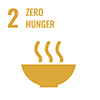




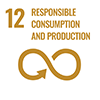

Related journals
This journal is part of our Business, management & strategy collection. Explore our Business, management & strategy subject area to find out more.
Journal of Strategy and Management
Journal of Strategy and Management is an international journal dedicated to improving the existing knowledge and...
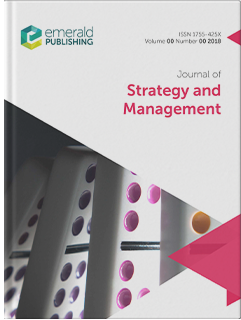
International Journal of Conflict Management
International Journal of Conflict Management is a premier international journal with global reach that provides scholars...
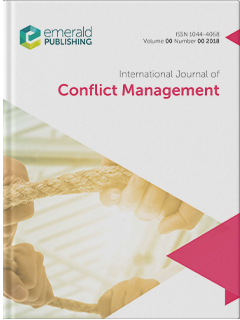
Society and Business Review
Society and Business Review (SBR) aims to cultivate and share knowledge and ideas in order to assist businesses and...
